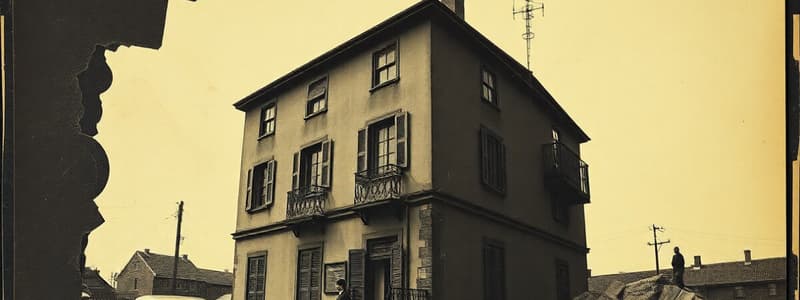Podcast
Questions and Answers
What is the primary purpose of CamScanner?
What is the primary purpose of CamScanner?
- To play music
- To manage social media accounts
- To create and edit videos
- To scan documents and convert them into digital format (correct)
Which feature would you expect to find in CamScanner?
Which feature would you expect to find in CamScanner?
- Music streaming service
- Video editing tools
- Text recognition technology (correct)
- Online gaming capabilities
CamScanner is best suited for which of the following user needs?
CamScanner is best suited for which of the following user needs?
- Digitizing physical documents (correct)
- Creating digital presentations
- Uploading videos to social media
- Editing photographs
What format can users typically save their scanned documents in using CamScanner?
What format can users typically save their scanned documents in using CamScanner?
Which of the following tasks is NOT commonly performed using CamScanner?
Which of the following tasks is NOT commonly performed using CamScanner?
Flashcards
CamScanner App
CamScanner App
A mobile application for scanning documents and converting them to digital images.
Document Scanning
Document Scanning
The process of converting physical documents into digital format.
Mobile Application
Mobile Application
Software designed to run on smartphones and tablets.
Digital Images
Digital Images
Signup and view all the flashcards
Conversion
Conversion
Signup and view all the flashcards
Study Notes
Critical Reading in a Changing World
- Critical reading is increasingly important, especially after events like September 11, 2001.
- Misunderstanding and poor education can have serious consequences.
- Understanding diverse voices, both from other cultures and within one's own, is vital.
- Critical study of one's own past (through documents, cultural, political, and religious texts) aids understanding of the present.
Methodology of the Book
- This book's methodology focuses on five key principles.
- Modern literary criticism often uses concepts rooted in philosophy and other disciplines.
- The book aims to contextualize literary history within the broader currents of Western thought.
- Examples are provided, like examining Plato and Kant's views on poetry.
Ancient Greek Literary Criticism
- Our English word "criticism" derives from the Greek term "krites," meaning "judge."
- Early criticism was integrated into the creative process of poetry, involving judgment about themes, techniques, and audience appeal.
- Ancient Greek criticism, encompassing the classical period (around 500 BC) and the Hellenistic period (323 BC onward), encompassed drama, poetry, philosophy, rhetoric, and the rise of Athenian democracy and power.
- The study of figures like Homer, Hesiod, Archilochus, Ibycus, Alcaeus, and Sappho represents significant moments in the development of Greek literary and critical traditions.
- Greek-style literary criticism encompassed self-assessment, reflection and judgment.
- The Athenian festivals saw literary criticism used to entertain and educate.
- Aristophanes’ plays like "The Frogs" show early instances of literary criticism.
- The play judged two famous tragic poets Aeschylus and Euripides regarding moral, ethical standards of poetry.
- The play used a courtroom setting to decide which of the poets was greater in ability and impact on Athenian society.
Greek Literary Criticism: Historical & Political Contexts
- Understanding ancient Greek criticism requires knowledge of the political, economic, and social contexts.
- The rise and fall of Athens and Sparta were critical in shaping Greek culture.
- Athens practiced a direct democracy; Sparta was governed by an oligarchy.
- The Peloponnesian War between Athens and Sparta had a significant impact on the development of thought about both poetry and politics.
- Plato and Aristotle were deeply affected by the ongoing political and military conflicts of their time.
Plato's Philosophy & Criticism
- Plato's philosophy offers an alternative view to the ideas and traditions of the poets.
- Plato critiques aspects of poets and orators in relation to democracy and truth.
- Plato emphasized truth and wisdom over emotion and imagination.
- Plato argues that poetry encourages emotional responses, which may be destabilizing to societal order.
- Plato's ideal state is rooted in reason, not emotion
- The Republic's allegory of the cave illustrates the nature and value of truth.
- Plato viewed poetry and rhetoric as potentially dangerous to the ideal state.
Plato's Theory of Forms
- Plato's theory of forms posits that the world we perceive through our senses is only a shadow of a higher, ideal reality.
- Ideal Forms are eternal, unchanging, and perfect essences, not contingent, physical objects
- The physical world, in contrast, is constantly changing and imperfect.
- Every physical object is a reflection or a “copy” of a corresponding Form.
- The theory posits a correspondence between the ideal Form and a class of physical objects, unifying a collection of physical objects into a common category.
- Plato's theory of the ideal Forms is related to his views on justice and the nature of the ideal state.
Other Important Concepts
- Pan-Hellenism
- Concepts of imitation (mimesis) and authority in relation to literature and poetry
- The relation of writing, speech, and poetry in terms of their capacity to transmit knowledge of truth
Studying That Suits You
Use AI to generate personalized quizzes and flashcards to suit your learning preferences.




